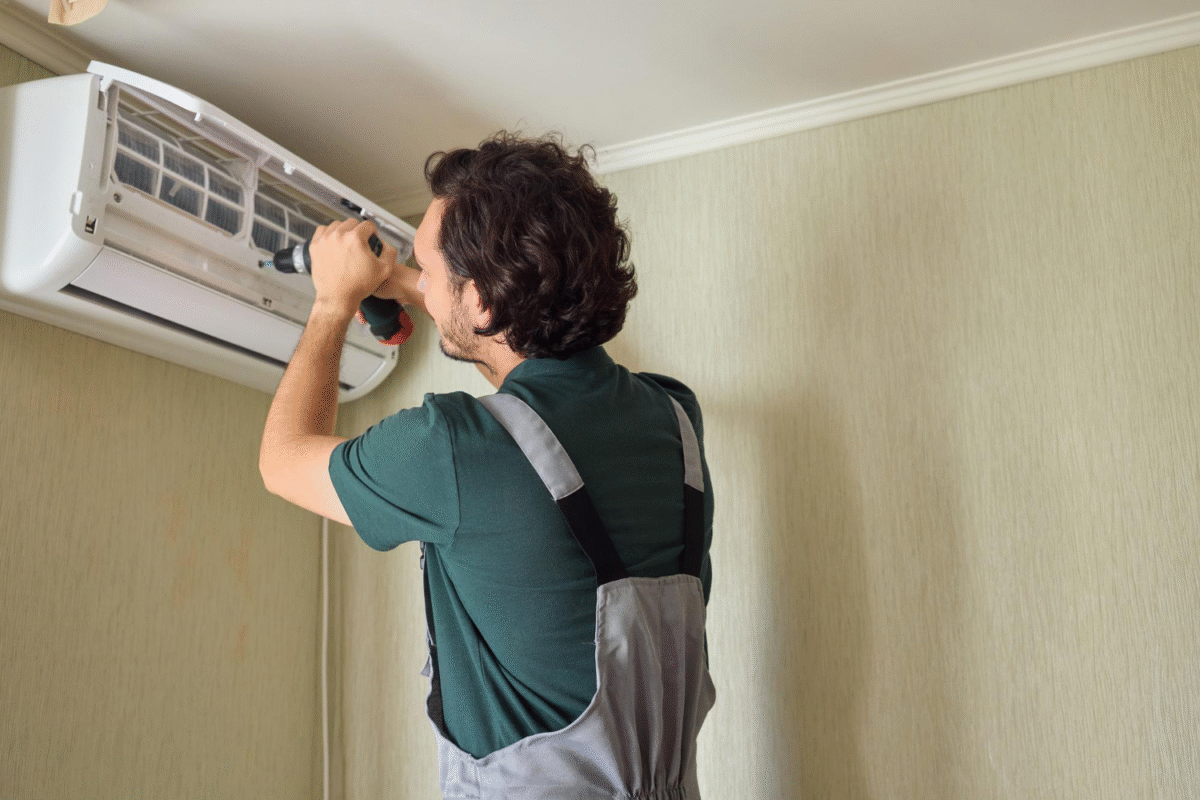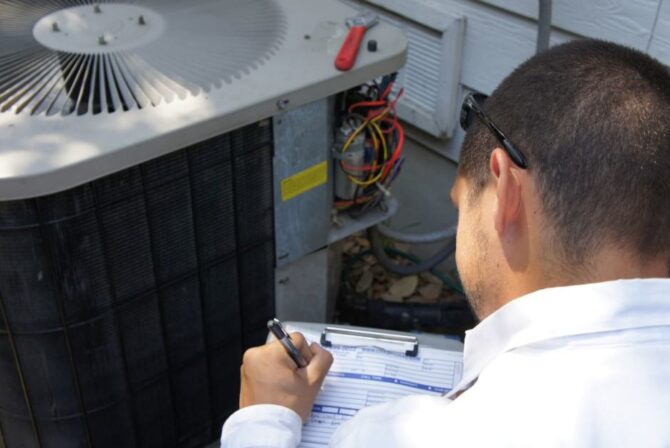Picture this: It’s 2 AM on a sweltering Houston summer night, the temperature outside is still pushing 85°F, and your air conditioner just stopped working. The humidity is climbing, your family can’t sleep, and you’re wondering if you’ll have to wait until morning for help. This scenario plays out thousands of times each year across Houston, where our subtropical climate makes a functioning AC system not just a comfort but a necessity. When your cooling system fails outside regular business hours, you need more than just any repair service—you need a reliable 24/7 emergency HVAC team that understands the urgency of your situation.
Understanding Emergency AC Situations in Houston
Not every AC problem qualifies as an emergency, but in Houston’s extreme climate, the line between inconvenience and crisis can blur quickly. Understanding what constitutes a true AC emergency helps you make informed decisions about when to call for after-hours service.
When to Call for Emergency AC Repair

Several situations warrant immediate attention from an emergency HVAC technician. Complete system failure during extreme temperatures tops the list, especially when vulnerable family members like elderly relatives, infants, or those with medical conditions are present. According to the Centers for Disease Control and Prevention, heat-related illnesses send over 67,000 Americans to emergency rooms annually, with many cases occurring in homes without proper cooling.
Electrical issues present another critical emergency scenario. If you notice burning smells, sparking, or unusual sounds coming from your AC unit, these symptoms could indicate serious electrical problems that pose fire hazards. The National Fire Protection Association reports that HVAC systems account for approximately 7,400 home fires annually, making prompt attention to electrical issues crucial.
Refrigerant leaks also demand immediate attention. Beyond the environmental concerns, refrigerant exposure can cause health issues including headaches, nausea, and respiratory problems. If you suspect a leak—often indicated by hissing sounds, ice formation on the unit, or a sweet, chemical smell—contact an emergency service immediately.
The True Cost of Delayed AC Repairs
While after-hours service typically carries premium rates, delaying necessary repairs can lead to far more expensive consequences. Understanding these potential costs helps justify the investment in emergency service when needed.
Financial Impact of Waiting
A minor issue ignored overnight can escalate into major component failure by morning. For instance, a failing capacitor—a relatively inexpensive repair at around $150-$400—can cause compressor damage if left unaddressed. Compressor replacement costs range from $1,500 to $2,800, making that emergency service call seem like a bargain in comparison.
Beyond equipment damage, consider the hidden costs of AC failure. In Houston’s humid climate, just 12 hours without proper cooling and dehumidification can lead to mold growth, particularly in areas with poor ventilation. Mold remediation costs average $2,000-$6,000 for moderate infestations, far exceeding any emergency service fees.
Health and Safety Considerations
The health implications of prolonged AC outages in Houston cannot be overstated. Heat exhaustion and heat stroke pose serious risks, particularly for vulnerable populations. Emergency room visits for heat-related illnesses can cost thousands of dollars, not to mention the physical toll on affected family members.
Additionally, high humidity levels resulting from AC failure can exacerbate respiratory conditions like asthma and allergies. The Environmental Protection Agency recommends maintaining indoor humidity between 30-50% to prevent health issues and structural damage—impossible without a functioning AC system in Houston’s climate.
What to Expect from 24/7 Emergency AC Service
Professional after-hours AC repair services operate differently from standard business-hour calls. Understanding what to expect helps you prepare for the service experience and ensures you choose the right provider.
Response Times and Availability
True 24/7 emergency services maintain dedicated after-hours teams, not just answering services. At 75 Degree AC, our emergency response team typically arrives within 60-90 minutes of your call, depending on your location in the Greater Houston area. This rapid response is crucial during extreme weather events when multiple systems may fail simultaneously.
Emergency technicians come fully equipped with common replacement parts, diagnostic tools, and the expertise to handle most repairs on the spot. This preparation minimizes downtime and often eliminates the need for follow-up visits.
Emergency Service Pricing Structure
After-hours service typically includes an emergency service fee ranging from $75-$200 above standard rates. However, reputable companies provide transparent pricing before beginning work. Be wary of services that won’t discuss pricing until after arrival—this often indicates predatory pricing practices.
Most emergency repairs fall into these categories:
- Electrical component replacement: $150-$600
- Refrigerant leak repair and recharge: $200-$1,500
- Blower motor replacement: $450-$2,000
- Capacitor or contactor replacement: $150-$400
- Thermostat issues: $100-$500
Common After-Hours AC Problems in Houston

Understanding the most frequent emergency AC issues helps homeowners identify problems quickly and communicate effectively with technicians.
Capacitor Failures
Capacitors store and release electrical energy to start and run your AC’s motors. Houston’s heat causes these components to work harder and fail more frequently than in milder climates. Signs of capacitor failure include humming sounds without the unit starting, or the AC turning off shortly after starting.
Emergency technicians carry universal and OEM capacitors for most AC brands, enabling quick replacement. The repair typically takes 30-45 minutes, restoring cooling quickly.
Compressor Lockouts and Overheating
Compressors may lock out due to overheating, particularly during Houston’s hottest days when systems run continuously. While some lockouts resolve with a simple reset, others indicate serious problems requiring immediate attention.
Professional technicians use specialized diagnostic equipment to determine whether the lockout stems from electrical issues, refrigerant problems, or mechanical failure. This precision prevents unnecessary compressor replacement—one of the most expensive AC repairs.
Refrigerant Leaks
Houston’s coastal humidity accelerates corrosion in outdoor AC units, leading to refrigerant leaks. Emergency leak detection uses electronic sensors, UV dye, or bubble solutions to pinpoint leak locations quickly.
Modern EPA regulations require proper refrigerant handling and leak repair before recharging systems. Emergency technicians carry the necessary equipment and certifications to handle these repairs legally and safely.
Preparing for Emergency AC Service
Taking specific steps before the technician arrives can expedite repairs and potentially reduce costs.
Essential Information to Gather
Document your AC system’s make, model, and age before calling. Note any unusual sounds, smells, or behaviors preceding the failure. This information helps dispatchers send technicians with appropriate parts and tools.
Clear the area around both indoor and outdoor units, ensuring safe, easy access. Remove any valuable items from the work area and secure pets in another room.
Safety Measures Before Help Arrives
If you suspect electrical problems, turn off the AC at both the thermostat and circuit breaker. For refrigerant leaks, open windows for ventilation and avoid the affected area. Never attempt DIY repairs on electrical components or refrigerant lines—these require professional handling for safety and legal compliance.
Keep family members hydrated and cool using fans, cool showers, and lightweight clothing while awaiting service. If anyone shows signs of heat exhaustion—dizziness, nausea, excessive sweating, or confusion—seek medical attention immediately.
Choosing the Right Emergency AC Service Provider
Not all emergency AC services deliver equal value. Selecting the right provider ensures quality repairs, fair pricing, and lasting solutions.
Credentials and Certifications
Legitimate emergency services maintain proper licensing through the Texas Department of Licensing and Regulation (TDLR). Technicians should hold EPA certification for refrigerant handling and manufacturer certifications for the brands they service.
Insurance coverage is non-negotiable. Verify that the company carries both liability insurance and workers’ compensation. This protection shields you from potential liability if accidents occur during after-hours service.
Red Flags to Avoid
Be cautious of services that:
- Demand full payment before beginning work
- Push for complete system replacement without thorough diagnosis
- Lack physical addresses or proper business registration
- Cannot provide references or show credentials
- Quote prices significantly below or above market rates
Research online reviews, but focus on recent feedback and how companies respond to complaints. The Better Business Bureau and Google Reviews offer valuable insights into a company’s emergency service quality.
Preventive Measures to Avoid Emergency Situations
While emergency services provide crucial support, preventing AC failures remains the best strategy for avoiding after-hours crises.
Regular Maintenance Programs
Professional maintenance twice yearly—spring and fall—catches potential problems before they cause system failure. Our AC maintenance services include comprehensive inspections, cleaning, and minor adjustments that extend system life and prevent emergency breakdowns.
Maintenance visits typically identify wearing components like capacitors, contactors, and fan motors before complete failure. Replacing these parts during regular business hours costs significantly less than emergency replacement.
Smart Monitoring Systems
Modern smart thermostats and monitoring systems alert homeowners to developing problems. Features like maintenance reminders, energy usage tracking, and fault detection help identify issues early.
Some systems even allow remote diagnosis by technicians, potentially resolving problems without emergency visits. This technology proves especially valuable for vacation homes or when traveling.
The 75 Degree AC Emergency Service Difference
At 75 Degree AC, we’ve built our reputation on reliable, honest emergency service throughout Greater Houston. Our approach combines technical expertise with genuine care for our customers’ comfort and safety.
Our Emergency Response Protocol
When you call our 24/7 hotline at (713) 598-2737, you speak directly with knowledgeable staff, not an answering service. We assess your situation, provide estimated arrival times, and dispatch the nearest available technician.
Our emergency technicians arrive in fully-stocked vehicles, prepared for most common repairs. We diagnose problems thoroughly, explain issues clearly, and provide upfront pricing before beginning work. This transparency eliminates surprise charges and builds trust during stressful situations.
Coverage Areas and Response Times
We provide emergency service throughout Houston and surrounding communities including Katy, Sugar Land, The Woodlands, Cypress, and Pearland. Our strategic technician placement ensures rapid response times, typically arriving within 60-90 minutes of your call.
During extreme weather events when demand peaks, we maintain clear communication about expected arrival times and prioritize calls based on urgency—ensuring those with medical needs or young children receive fastest service.
Making the Right Decision When AC Emergencies Strike
After-hours AC failure in Houston creates genuine emergencies requiring professional intervention. The combination of extreme heat, high humidity, and potential health risks makes prompt repair essential for your family’s safety and comfort.
While emergency service costs exceed standard rates, the investment protects against more expensive equipment damage, health issues, and property damage from humidity and heat. Choosing a reputable emergency service provider ensures quality repairs, fair pricing, and lasting solutions.
Remember these key takeaways when facing an AC emergency:
- Assess the severity of your situation to determine if emergency service is necessary
- Document symptoms and system information before calling for service
- Choose licensed, insured providers with transparent pricing
- Take safety precautions while awaiting service
- Invest in preventive maintenance to minimize future emergencies
When your AC fails after hours, don’t let the heat and humidity compromise your family’s comfort and health. Contact 75 Degree AC’s emergency service team at (713) 598-2737 for prompt, professional repair service you can trust. Our certified technicians are standing by 24/7 to restore your cooling and peace of mind.
Don’t suffer through another sleepless night in Houston’s heat. Call 75 Degree AC now at (713) 598-2737 for immediate emergency AC repair service. Our expert technicians are ready to restore your comfort 24 hours a day, 7 days a week. We also offer comprehensive AC repair and AC installation services during regular business hours.
Frequently Asked Questions

What qualifies as an AC emergency requiring after-hours service?
Complete system failure during extreme temperatures, electrical issues like burning smells or sparking, refrigerant leaks, and situations involving vulnerable family members (elderly, infants, or those with medical conditions) all qualify as emergencies. If indoor temperatures exceed 85°F or you notice signs of heat-related illness, call for emergency service immediately.
How much more does emergency AC service cost compared to regular service?
Emergency service typically includes an after-hours fee of $75-$200 above standard rates. However, total costs depend on the specific repair needed. Most emergency repairs range from $150-$2,000, with common issues like capacitor replacement costing $150-$400. Reputable companies provide upfront pricing before beginning work.
How quickly can I expect an emergency technician to arrive?
Response times vary by location and demand, but professional emergency services typically arrive within 60-90 minutes in the Houston area. During extreme weather events when multiple systems fail, wait times may extend to 2-3 hours. Quality providers maintain clear communication about expected arrival times.
Can emergency technicians complete repairs on the first visit?
Most emergency technicians arrive with common replacement parts and can complete standard repairs immediately. This includes capacitor replacement, contactor replacement, thermostat repairs, and many electrical issues. Complex repairs requiring special-order parts may require temporary solutions until permanent repairs can be completed.
Should I attempt any troubleshooting before calling for emergency service?
Basic troubleshooting is acceptable: check your circuit breaker, ensure the thermostat has power and is set correctly, and replace air filters if extremely dirty. However, never attempt electrical repairs, refrigerant handling, or component replacement yourself. If basic checks don’t resolve the issue, call for professional emergency service to avoid injury or further damage.

